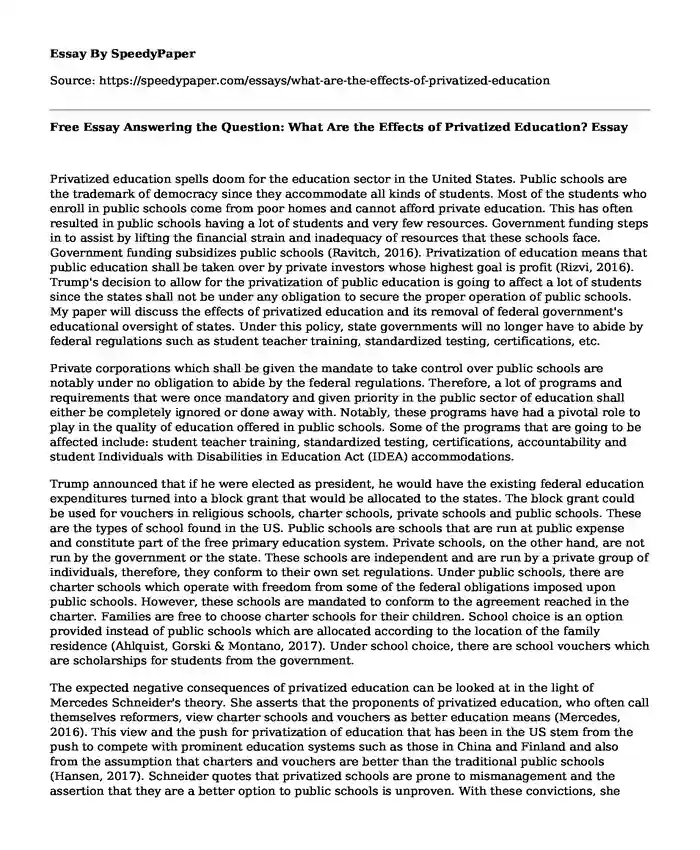Privatized education spells doom for the education sector in the United States. Public schools are the trademark of democracy since they accommodate all kinds of students. Most of the students who enroll in public schools come from poor homes and cannot afford private education. This has often resulted in public schools having a lot of students and very few resources. Government funding steps in to assist by lifting the financial strain and inadequacy of resources that these schools face. Government funding subsidizes public schools (Ravitch, 2016). Privatization of education means that public education shall be taken over by private investors whose highest goal is profit (Rizvi, 2016). Trump's decision to allow for the privatization of public education is going to affect a lot of students since the states shall not be under any obligation to secure the proper operation of public schools. My paper will discuss the effects of privatized education and its removal of federal government's educational oversight of states. Under this policy, state governments will no longer have to abide by federal regulations such as student teacher training, standardized testing, certifications, etc.
Private corporations which shall be given the mandate to take control over public schools are notably under no obligation to abide by the federal regulations. Therefore, a lot of programs and requirements that were once mandatory and given priority in the public sector of education shall either be completely ignored or done away with. Notably, these programs have had a pivotal role to play in the quality of education offered in public schools. Some of the programs that are going to be affected include: student teacher training, standardized testing, certifications, accountability and student Individuals with Disabilities in Education Act (IDEA) accommodations.
Trump announced that if he were elected as president, he would have the existing federal education expenditures turned into a block grant that would be allocated to the states. The block grant could be used for vouchers in religious schools, charter schools, private schools and public schools. These are the types of school found in the US. Public schools are schools that are run at public expense and constitute part of the free primary education system. Private schools, on the other hand, are not run by the government or the state. These schools are independent and are run by a private group of individuals, therefore, they conform to their own set regulations. Under public schools, there are charter schools which operate with freedom from some of the federal obligations imposed upon public schools. However, these schools are mandated to conform to the agreement reached in the charter. Families are free to choose charter schools for their children. School choice is an option provided instead of public schools which are allocated according to the location of the family residence (Ahlquist, Gorski & Montano, 2017). Under school choice, there are school vouchers which are scholarships for students from the government.
The expected negative consequences of privatized education can be looked at in the light of Mercedes Schneider's theory. She asserts that the proponents of privatized education, who often call themselves reformers, view charter schools and vouchers as better education means (Mercedes, 2016). This view and the push for privatization of education that has been in the US stem from the push to compete with prominent education systems such as those in China and Finland and also from the assumption that charters and vouchers are better than the traditional public schools (Hansen, 2017). Schneider quotes that privatized schools are prone to mismanagement and the assertion that they are a better option to public schools is unproven. With these convictions, she goes further to confirm the negative impacts that privatized education shall bring to students and to the education system. The other documents that inform Schneider's research into privatized schools include Supreme Court case Board vs. Education and the Milton Friedman 1995 essay which advocated for school vouchers.
In conclusion, privatized education is predicted to bring gloom in the public education sector. Aside from creating room for the mismanagement, closure, and consolidation of private schools, privatization shall disadvantage many students and probably lower the quality of education in schools because of the phasing out of programs such as standardized testing.
References
Ravitch, D. (2016). When Public Goes Private, as Trump Wants: What Happens? The New York Review of Books. Retrieved from; http://www.nybooks.com/articles/2016/12/08/when-public-goes-private-as-trump-wants-what-happens/
Hansen, D. (2017). Privatization of public education is a failure. The Huffington Post. Retrieved from: https://www.huffingtonpost.com/dale-hansen/privatization-of-public-e_b_10319426.html
Rizvi, F. (2016). Privatization in Education: Trends and Consequences. UNESCO. Retrieved from: http://unesdoc.unesco.org/images/0024/002464/246485E.pdf
Schneider, M. (2016). School Choice: The End of Public Education? New York, USA: Teachers College Press.
Ahlquist, R., Gorski, P.C. & Montano, T. (Eds.). (2017). Assault on Kids and Teachers: Countering Privatization, Deficit Ideologies and Standardization in the U.S. Schools. New York, USA: Peter Lang Publishing Inc.
Cite this page
Free Essay Answering the Question: What Are the Effects of Privatized Education?. (2022, Apr 06). Retrieved from https://speedypaper.com/essays/what-are-the-effects-of-privatized-education
Request Removal
If you are the original author of this essay and no longer wish to have it published on the SpeedyPaper website, please click below to request its removal:
- Systems Thinking Essay Sample
- Creative Writing Essay Samples
- Essay Sample on the Concept of Intersectionality in the Story Becky by Jean Toomer
- Essay Sample: Gender Differences in the Relation between Mothering Behaviors and Child-Behavior Problems
- Property Taxation in California
- Essay Sample on Job Satisfaction Annotated Bibliography
- Paper Example. Online Learning is Less Satisfactory than Face-To-Face
Popular categories





